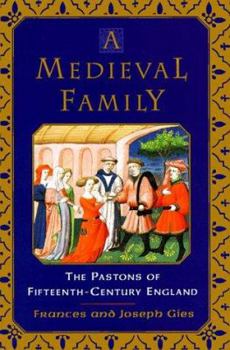A Medieval Family: The Pastons of Fifteenth-Century England
Select Format
Select Condition 
Book Overview
The Paston family of Norfolk, England, has long been known to medieval scholars for its large collection of personal correspondence, which has survived five centuries. Revealing a wealth of information about manners, morals, lifestyle, and attitudes of the late Middle Ages, the letters also tell the story of three generations of the fifteenth-century Paston family that treads like a historical novel full of memorable characters: Margaret Paston, the...
Format:Hardcover
Language:English
ISBN:0060172649
ISBN13:9780060172640
Release Date:July 1998
Publisher:Harper
Length:416 Pages
Weight:1.25 lbs.
Dimensions:1.3" x 5.5" x 8.3"
Customer Reviews
2 ratings
Engrossing history
Published by Thriftbooks.com User , 16 years ago
The Pastons were not a likeable bunch. They were ambitious, litigious and acquisitive, embroiled in endless fights (both in and out of court) for diverse manors and lands - and making innocent parties, such as their servants and tenants, suffer as a consequence of these fights. They probably did not think twice about perjuring themselves in issues as sensitive as a man's last will, if it was in their interests to do so. They did not hesitate to change allegiances if the lord they served suddenly fell from favour, as often happened in those politically fraught times. They were snobbish social climbers, not above considering a mercer's daughter as a prospective bride if she happened to have a good dowry, but turning their back on their own daughter and sister when she had the audacity of marrying for love. They are not pleasant people, at least by modern-day standards. And yet (or maybe because of it) their lives are fascinating. We are lucky that this medieval family's letters have been preserved, thus providing us with a priceless window into the late Middle Ages and what England was like at that time. And we are also lucky that there are scholars such as Frances and Joseph Gies, capable of weaving the letters into a gripping narrative that takes us through three generations of a family's life. This book is a real page-turner. There are very few things missing. One oddity, in my opinion, is that the excommunication of one of the Paston patriarchs was passed over in one or two lines. Religion was all-important in the Middle Ages, so I suppose being excommunicated must have had a great impact (both practical and psychological) on this individual and his relatives. However, the issue was not analyzed. Also, I would have enjoyed more info on young Margery Paston's clandestine marriage to Richard Calle, the Paston bailiff. Margery defied her family in marrying a man they considered their social inferior, and was shunned by them for it. No information is given on her or her husband's later lives, except for the fact that apparently they had three surviving children. Margery and Richard are the two most endearing people in this chronicle, and I would have liked to know more about what happened to them (indeed, one hopes that they were happy!). But, all in all, this book was a great read, and a source of important knowledge about the Wars of the Roses, as well as about the lives of a social class whose fortunes were on the rise towards the end of the fifteenth century.
Wonderful Insight into Family in Medieval England
Published by Thriftbooks.com User , 22 years ago
While the book boasts a large cast of interesting characters, the Paston family really comes alive through the Gies' judicious use of the family's own words...three generations of Paston and Paston associates' letters. It is non-fiction, but through the letters and the context provided by the Gies' extensive research, the book reads like a non-fiction novel. I especially enjoyed Margaret Paston and the wry humor she managed to express in her letters as she played an important part in both family battles and the land battles that were common in her time. I was also impressed with the small world that medieval England must have been. Chaucer's relatives, a few English kings, Queen Margaret, and Sir John Fastolf (the basis for Shakespeare's Falstaf) all came and went in various roles of importance in the lives of an otherwise everyday middle class family.






